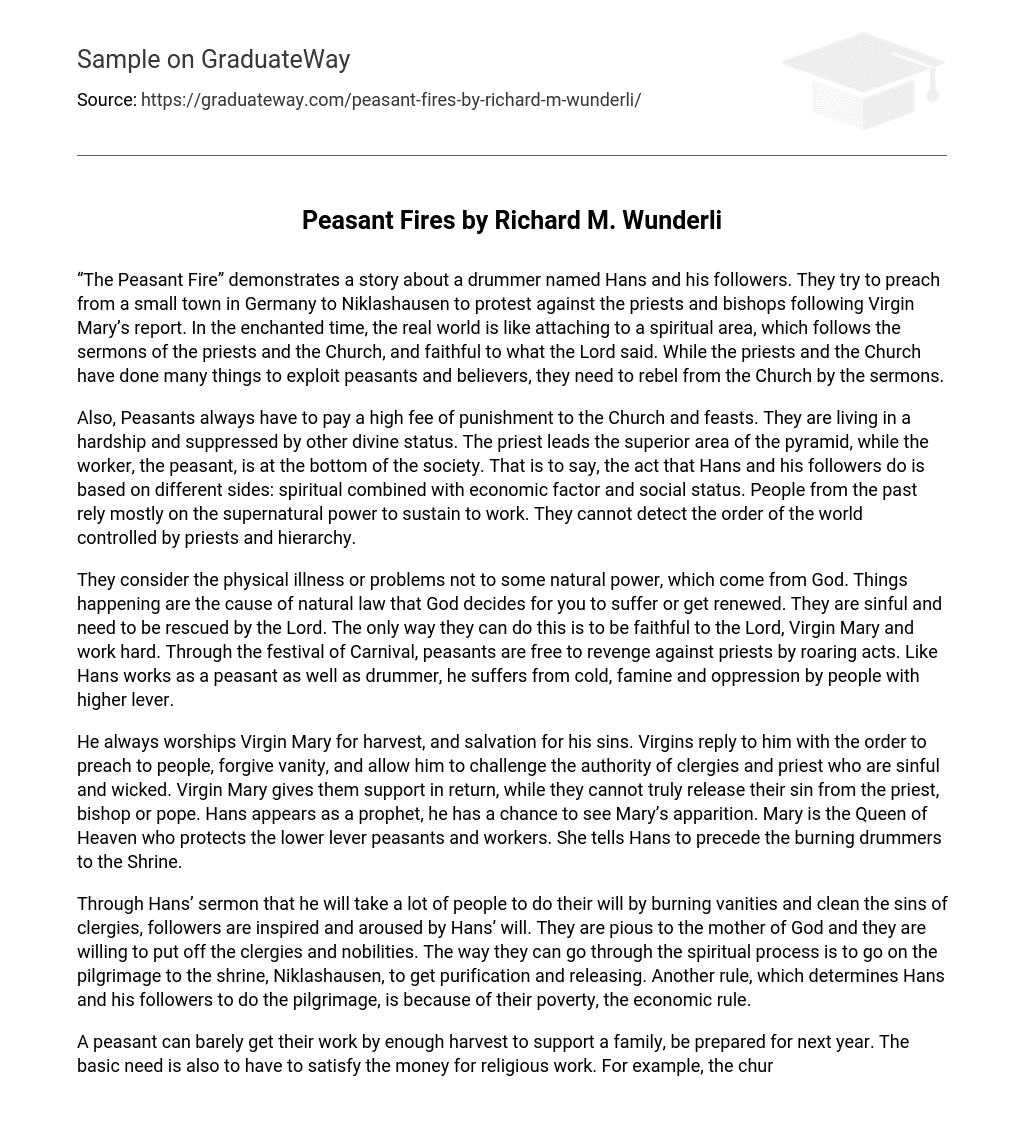“The Peasant Fire” demonstrates a story about a drummer named Hans and his followers. They try to preach from a small town in Germany to Niklashausen to protest against the priests and bishops following Virgin Mary’s report. In the enchanted time, the real world is like attaching to a spiritual area, which follows the sermons of the priests and the Church, and faithful to what the Lord said. While the priests and the Church have done many things to exploit peasants and believers, they need to rebel from the Church by the sermons.
Also, Peasants always have to pay a high fee of punishment to the Church and feasts. They are living in a hardship and suppressed by other divine status. The priest leads the superior area of the pyramid, while the worker, the peasant, is at the bottom of the society. That is to say, the act that Hans and his followers do is based on different sides: spiritual combined with economic factor and social status. People from the past rely mostly on the supernatural power to sustain to work. They cannot detect the order of the world controlled by priests and hierarchy.
They consider the physical illness or problems not to some natural power, which come from God. Things happening are the cause of natural law that God decides for you to suffer or get renewed. They are sinful and need to be rescued by the Lord. The only way they can do this is to be faithful to the Lord, Virgin Mary and work hard. Through the festival of Carnival, peasants are free to revenge against priests by roaring acts. Like Hans works as a peasant as well as drummer, he suffers from cold, famine and oppression by people with higher lever.
He always worships Virgin Mary for harvest, and salvation for his sins. Virgins reply to him with the order to preach to people, forgive vanity, and allow him to challenge the authority of clergies and priest who are sinful and wicked. Virgin Mary gives them support in return, while they cannot truly release their sin from the priest, bishop or pope. Hans appears as a prophet, he has a chance to see Mary’s apparition. Mary is the Queen of Heaven who protects the lower lever peasants and workers. She tells Hans to precede the burning drummers to the Shrine.
Through Hans’ sermon that he will take a lot of people to do their will by burning vanities and clean the sins of clergies, followers are inspired and aroused by Hans’ will. They are pious to the mother of God and they are willing to put off the clergies and nobilities. The way they can go through the spiritual process is to go on the pilgrimage to the shrine, Niklashausen, to get purification and releasing. Another rule, which determines Hans and his followers to do the pilgrimage, is because of their poverty, the economic rule.
A peasant can barely get their work by enough harvest to support a family, be prepared for next year. The basic need is also to have to satisfy the money for religious work. For example, the church holds different feasts to the revival of Christ, Lent to get huge revenue from peasants and followers, and births, wedding and funerals. Peasants do not get enough money for living while they still are in a poor condition. The priest, clergy and bishop get their pay from peasants and other layman to support their living.
The bishop of Wurzburg gets money from merchants and priests to pay off the debt from the construction of more buildings and cathedrals in fifteenth century. The clergy and priests have their own law that they set apart from paying taxes and tolls. The peasants use the religious power to replace their rage against clergy, lords and bishops. They forced them to work hard and earn less money along with tax increases. However, they do not do austerity, they uphold good meals and luxury clothes by trembling poor peasants instead. Besides those, the economic basis is the root of society.
If people get unjust treatment, they will fight for their own deeds. That is how followers are loyal to Hans. They are not escaping purgatory from friars by being poor and giving up enough money. Both economic and spiritual combines, and leads the pilgrimage to the Shrine. Spiritual power is a tool to ask for justice and economic equality. At the end of the story, Hans and his followers cease their pilgrimage and a bishop executes Hans. The outcome of their pilgrimage is evidenced by their failure in a churches’ reformation in Niklashausen.
Bishops do not change the situation among peasants. Social status is also contributing in the journey to the Shrine. Hans and his followers do not overturn the power of the priests. Hans is caught secretly and the pilgrims loose the leadership of the Holy youth. They stop fighting against the secure power. In summary, peasants do not get enough economic need and right status compared with the clergies and priests. Their sincere beliefs to God are taken advantage by greedy clergies. According to “the twelve articles of the Peasants”.
Peasants challenged the authority of minsters that do not teach the right gospel to layman and do not conduct themselves well. Their tithes are not given to God; instead they are given to ministers. Spiritual and economic powers are the strength that allowed the followers to continue following in Hans’ footsteps. They follow in the faith that Virgin Mary is protecting them and help to overthrow hardship and oppression by clergies. Though the pilgrimage to Niklashause fails, they break through the castle of the bishop and request the release of Hans.





